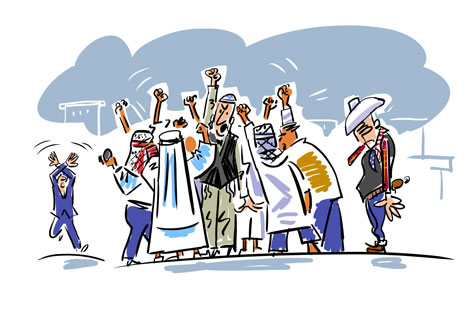
Drawing by Alexei Yorsh. Click to enlarge the image.
After a series of wars, a system of formal and informal relationships has gradually emerged in the region since the late 1970s.
Russian Foreign Ministry hails Gaza ceasefire
No peace process between Palestine and Israel
Muscovite Jewish community demonstrates solidarity Israel
Lavrov confirms impermissibility of strikes on Israeli south, Gaza
With American support, Israel made separate peace agreements with Egypt and then with Jordan, which broke the all-out blockade of the Jewish state by its Arab neighbors. The United States, in turn, was building ties with the richest and most influential Arab countries — above all, the Persian Gulf monarchies.
While Washington’s allies and partners remained Israel’s adversaries, they did not do anything to upset that balance and kept it in place. Turkey even established cooperation with the Israelis at the level of special services and military and technical exchanges.
While the Palestinian question remained a bone of contention after the collapse of the Soviet Union, the Arab sponsors of the Palestinians preferred to keep the status quo – especially as the “peace process” in the 1990s created the illusion of progress toward a settlement, and respectable Arab countries could make do by paying lip service to it.
Even Syria, Israel’s sworn enemy, was party to an unofficial non-aggression pact; although the subject of the occupied Golan Heights remained a ticking time bomb.
Everything started falling apart with the advent of the 21st century. The peace process became deadlocked, something that has been manifested not only in the changing mood of Israeli citizens, who are no longer voting for left-wing doves, but also in Palestine’s split into the West Bank, ruled by the old-time Palestinian elite, and Gaza, where Hamas calls the shots.
Attempts by the United States to stimulate a reorganization of the Middle East have led to Iraq becoming a de facto Iranian backyard, an increase in general anxiety, and the worsening of the confrontation between the Sunnis and the Shiites. When the energy of the masses exploded into the “Arab Spring,” it turned out that these new sentiments carried many things, except growing sympathy for the West, America or Israel.
Besides the above-mentioned political and diplomatic balance, Israel’s confidence in its own future has been based on its image as a country that always and inevitably resolves any problems by force, thanks to its military advantage, its readiness to follow through no matter what the cost, and guarantees of international support (because the United States was automatically blocking any anti-Israel measures).
Now, all three of those premises have been called into question.
The 2006 military campaign against Hezbollah in southern Lebanon did not bring Israel a decisive success. Its previous operation in Gaza (2009’s Cast Lead operation) did not quite become a triumph either. In other words, the faith in its ability to effectively put out crises with armed force has been shaken.
In addition, Israel has been the target of scathing criticism by practically the entire global community, including the European Union, which it cannot ignore. Even the United States is forced to apply pressure on the Jewish state to put an end to violence; the best Washington can do is give its ally some more time.
Israel’s outlook is even gloomier. The perennial Palestinian question has become small change in the complicated reorganization of the Middle East. The new Egyptian rulers are bent on re-casting Cairo as the political capital of the Arab world.
Therefore, they will most likely dismantle the Camp David accords gradually and behave more assertively on the Palestinian front (claiming the role of the principal patron), as well as on the Syrian issue (promoting a regional solution there through “The Four” of the regional powers).
However, Doha (State of Qatar) is trying to upstage Cairo on all of those matters. A visit by the emir of Qatar to Gaza a couple of weeks ago had everyone saying that Hamas, formerly oriented toward Syria and Iran, had found a new sponsor that views itself as the herald of change in the Arab world and the leader of the crusade against the influence of the Shiites.
In general, Qatar has nothing against acting as the “core” of the Muslim Brotherhood movement, which has already come to power in Egypt and is becoming increasingly active elsewhere, too.
Tensions are rising in Jordan, where discontent is growing and seemingly not without encouragement from the Gulf. Someone is ready to involve this country in the process of ideological change, as well, and, possibly, in the resolution of the Palestinian question. Turkey has taken an outspoken anti-Israeli stand.
The American positions in the Middle East have been shaky lately. Washington has traditionally relied on Sunni regimes, but they are turning Islamist, one by one. The Americans are in conflict over Iran with the increasingly influential Shiites. Their commitment to unconditional support of Israel is becoming, if not a burden for the United States, then a restraint on its attempts to build a new system of relations in the region.
A continuation of the operation would have threatened to leave Israel in total isolation, while a withdrawal short of achieving an unequivocal result may convince the Arabs that Israel is not what it used to be.
Fyodor Lukyanov is
editor-in-chief of Russia in Global Affairs. First published in Russian in Rossiyskaya Gazeta.
All rights reserved by Rossiyskaya Gazeta.
Subscribe
to our newsletter!
Get the week's best stories straight to your inbox